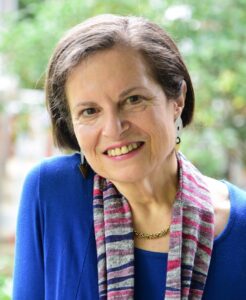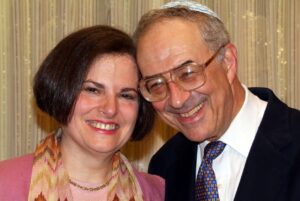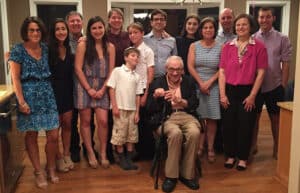-
07 June 2023
 After Sue Ducat’s husband, Stanley M. Cohen, passed away in 2020, Sue worked with the Jewish Community Foundation to launch a multi-generational philanthropic project, designed to make the best use of funds today while growing the family’s legacy in the long-term.
After Sue Ducat’s husband, Stanley M. Cohen, passed away in 2020, Sue worked with the Jewish Community Foundation to launch a multi-generational philanthropic project, designed to make the best use of funds today while growing the family’s legacy in the long-term.
Currently, Sue’s donor advised fund endows a scholarship that enables one accomplished high school student from BBYO’s Kallah program to travel to Europe and tour concentration camps and other historically significant sites. The goal of the program is to help educate the next generation about the atrocities of the Holocaust and pass on the lessons and memories that emerged. Sue is planning to reach out to her family and her friends in the coming weeks and invite them to donate to the fund.
Below, Sue discusses what this shared philanthropic effort means to her and her family’s legacy.
Thank you so much for taking the time to do this. We are excited to be able to share your story with the Jewish community of Greater Washington and with fellow donors and philanthropists like yourself.
Can you tell me about your husband Stanley? What was he passionate about? What kind of work was he involved in when it came to Jewish life?
Stan died, unfortunately, of COVID in an assisted living facility. He died right in April 2020, at the beginning when there was nothing anyone could really do. Federation, at that moment, had an emergency COVID fund and we said, okay, why don’t we donate in his memory to the COVID fund? But that wasn’t something that was about him.
So, I wondered, how do I repurpose this in a way that I think he would have liked? And I thought a lot about it and talked to my stepchildren. I have three stepchildren from his late first wife and we have a daughter together. The one thing that rose above everything else was remembering, teaching your children the lessons of the Holocaust.
Every year for many years at Adas Israel, Stan delivered a martyrology on Yom Kippur to again remember those lessons from the Holocaust. He was also one of the founders of their Garden of the Righteous, which honors righteous gentiles. He worked for 40 years in the Department of Education, and they took the lead in the Federal Government’s annual Yom HaShoah (Holocaust Remembrance Day) ceremonies. There used to be a ceremony at the Capitol every year to observe Yom HaShoah and he was on the planning committee and one of the federal representatives. He was always active in that way. Ironically, Stan actually died on Yom HaShoah.
When it comes to your family, children, and grandchildren, how do they relate to Jewish identity? Is that important to them? How do you talk to them about what Jewish identity means?
Oh, they each have their own take on it. One of my granddaughters participated in the Avodah program last year after graduating from college, and she went to New Orleans and volunteered helping prisoners who were just getting out. And she was such a wonderful fit for the program, they asked her to stay another year and another and another. Her older sister is also involved in her own way.
My other grandsons went to Charles E. Smith Jewish Day School and one actually teaches there now. They’re all very involved in their own synagogues. My stepson is the president of his synagogue in Brooklyn, and his children have their own involvement. So, each one does their own thing. My daughter went to Capital Camps and she’s trying to find a Jewish community in Portland. All of the children got a lot of inspiration from Stan, and they passed that on to their children, in turn.
You have a goal to build a legacy that spans generations of your family. Can you tell me more about that? What do you hope to accomplish in the short term and what is your vision for twenty years from now?
I’m not new to donating, but I’m new to donating at this at this level and creating something new. My husband did create two memorial funds when his first wife passed away. In some ways, Stan was my role model.
The whole lesson of remembering was really, really important to Stan. So how better to honor that than to endow a scholarship for the next generation, to help someone to go see the concentration camps and hope that this doesn’t happen again? We created this scholarship in partnership with BBYO and Kallah program (we may consider a shift when March of the Living resumes). There will be a student participating this year and hopefully, every year from now on. I am hoping it’s called the Stanley Cohen Scholarship.
You could see just continuing to support the scholarship for as long as possible. Is that the goal?
I see it now as one student a year, but who knows.
Yes, it could grow organically.
You never know!
Did you come to the Jewish Community Foundation with the vision of the scholarship?
No, it was all just that I wanted to do something for my Stan. And that it was going to be about remembering. And it’s through a lot of conversations with my kids and with team members at the Foundation, including Sara [Brenner], that the scholarship took shape.
Is there anything you would want people who are attempting a similar project to know? Are there things to watch out for, things to keep in mind? What advice do you have for people in a similar position who are maybe going to be fundraising among family and friends potentially for the first time?
Well, I would say that I was a little impatient at the beginning because I felt, oh, my husband died. I haven’t thought of anything yet. I really want to honor his life. So, my advice is to be patient and just really think about it a lot. And when something’s right, it’ll come to you. And then look for support.
You take your idea and figure out what’s possible. At first, it was complicated because it involved giving the money to Federation to figure out how to how to manage the program and help me make the connection with BBYO. All of this takes time and people are busy. Even people who are on the receiving end of money. You have to be patient and they have to be patient with you. You’re growing something together. Creating it together.
It’s a wonderful thing to work on and very therapeutic. It’s part of the grieving. Of course, you don’t have to give only to honor people who died, but it’s a wonderful way to feel connected to your loved one.
On the family side, is there anything you would advise or recommend when you do go to write that email to send to family and friends? Do you have an idea of what it would say, what the message would be in that email?
My message is going to be, I wanted you to know what I’ve done for Stan, and this is it. This is why it’s important. And if you would like to contribute, this is how you can do it.
I’m not going to say I hope you donate. Some people might also say, I’ve done this. I don’t want to do that. I want to do what I want to do to commemorate Stan. And that’s fine, too.
How does this effort fit into who you are and your Jewish identity?
Well, my Jewish identity has really evolved. I grew up in New York, the daughter of two Holocaust survivors. They both came to this country very late. My father came in 1938 right after Kristallnacht. My mother, just by the skin of her teeth, made it into this country in September of 1941, before the war. They wouldn’t have gotten in much later than that.
The Holocaust was something neither one really wanted to talk about when we were children. My sister and I grew up in a community of a lot of other adults who were also Holocaust survivors, but they didn’t talk about it so much.
When I met Stan, I was already in my 30s. I’d never known someone who felt that strongly about being a practicing Jew, about being part of a community. That was all new to me and I was like a sponge. I learned it, I absorbed it. I had never joined a synagogue. My parents were briefly members when I was a child. And they didn’t keep it going because it really didn’t mean anything to them. They weren’t joiners.
And all of a sudden, I was in an adult Bat Mitzvah class. Soon after I joined Adas Israel, I got involved in committees. So, it grew with me and when Stan died, it was kind of like, what of all that shared experience, sending my daughter to a day school and everything else? What do I now want to hold onto? And the answer is most of it. It became part of my world.
What do you think Stanley would say about all of this?
I think he’d be happy about it. He was a very funny man. He was very specific and precise. He was a wordsmith, too. You had to you had to really mind your p’s and q’s. But I think he would have thought that we had nailed what he valued the most.
Dreaming big, if you and Stanley could have the impact that you wanted in this space of remembering, what would it be? What would the vision be 50 years from now?
I see this as a one by one by one change. If the scholarship recipient that’s going to Europe this year could say, “the turning point for me was the program I did when I was 16 years old,” that would be success. Perhaps they would say, “it really opened my eyes what happened during the Holocaust. It made it clear, and I couldn’t have done this if this scholarship hadn’t come along.”
If enough people say that, then that’s how movements get started and consciousness builds. If you want to improve the world, you have to do it one by one by one. You can’t do it in a mass way. It is all about individual connections.

